Interview with Leland Cobain Part 2
As Kurt grew, Leland Cobain remembers a normal teenager, one who'd profess boredom one minute and become intensely involved in an art project the next.
By Jeff BurlingameDaily World A&E editor
Underneath the bridge
Tarp has sprung a leak
And the animals I've trapped
Have all become my pets
Something in the way
Surprisingly to some and not so to others, his status as icon didn't end with his death. Every anniversary, new release and major Nirvana-related event that passes brings more attention and, ultimately, a new wave of fans looking to rebel against whatever the current musical trend is. Don't like over-produced teen pop music? Not a fan of wearing your baseball cap off to one side and bending your fingers in weird gang-related fashion as tribute to your "Homey Gs"? Believe music should be created by people and not over-processed computer sounds programmed with the punch of a keyboard? Then Nirvana is what you want in your CD player. Kurt Cobain's popularity 10 years after his death is strong evidence that that will never end.
Leland Cobain doesn't know Nirvana's music too well. He enjoyed their performance on MTV's "Unplugged" but couldn't relate with much else the band did.
"I'm from the '30s and '40s. Glenn Miller. But when I seen Kurt on the MTV with just him and the guitar, I liked that," Cobain says. "Without all those drums beating and noise I could understand him."
It was the amplified, distorted, stop-start, slow-fast musical attack that kept Leland Cobain from knowing what the lyrics were to the songs on most of his grandson's studio albums. Though he has at least one copy of every Nirvana album, cassette tapes his medium of choice, he was surprised to know his grandson had written a song about the estranged relationship with Donald Cobain, Leland's son and Kurt's father.
As my bones grew/They did hurt
They hurt really bad
I tried hard to have a father/But instead I had a dad
I just want you to know that I don't hate you anymore
There is nothing I can say that I haven't thought before
Kurt Cobain had arrived hours earlier at Swedish Hospital in Seattle with a large vase of orchids for his grandmother. The vase is still in a cabinet in his grandfather's living room, alongside photographs of family members, drawings by Kurt and Iris, and a potpourri of other mementos. Included in that is a snapshot of a Florida family, which, on Christmas 2002, flew Leland Cobain to their family home for a three-night stay. "We'd talked on the phone about Kurt and they just wanted to meet me," says Leland, an ex-Marine, asphalt roller driver and fireman. "They were really nice people."
There's no hidden significance to the Mickey Mouse watch Leland Cobain wears every day on his right wrist, although one of his best and most telling stories about his grandson begins with a mention of the famous Disney character.
"Kurt came over and gave me a drawing he'd done of Mickey Mouse," Leland Cobain remembers. "It was real good so I said, 'You didn't draw that, you traced that.' He was only 6. So I found some orange paper Iris had lying around and gave him some. He sat there and drew a Donald Duck and then drew a Goofy and gave them to me, smiling because he had shown me up."
When Kurt Cobain was 9 his parents divorced, leaving him unhappy at home with either parent. He spent his adolescence shuttled between family members
and friends.
"He even lived with me twice," Leland Cobain says. "Then his dad got a place across the way and he moved in there."
As Kurt grew, Leland Cobain remembers a normal teenager, one who'd profess boredom one minute and become intensely involved in an art project the next. From building an ornate dollhouse with Grandpa to carving a chess set out of wood scraps, Kurt Cobain was always active and artistic. He even played some
guitar.
"We had an old Hawaiian guitar and an old amplifier we let him have when he lived with us," Leland Cobain says. "I have no idea what happened to it but the amplifier, the way Kurt played, probably blew up."
Jeff Burlingame is The Daily World's arts and entertainment editor. He and Aberdeen City Councilman Paul Fritts are co-chairmen of a committee to memorialize Kurt Cobain.
Page 1 | Page 2
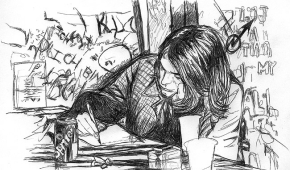
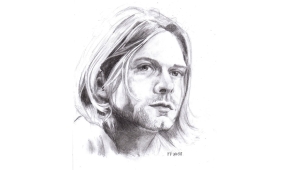

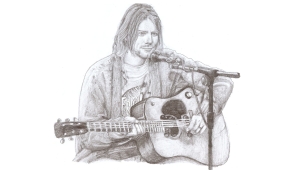

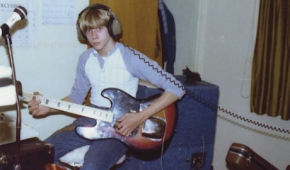
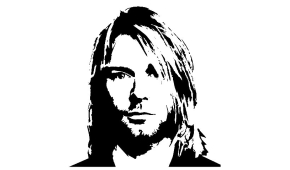

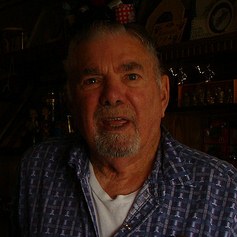 Leland Cobain is the only member of the Cobain family that is willing to
talk to Nirvana fans about his grandson. He lives in a trailer in Montesano,
a couple hours outside of Aberdeen, and spends his days answering mail about
Kurt Cobain, taking phone calls, and visiting with superfans making a
pilgrimage to Cobain’s old haunts.
Leland Cobain is the only member of the Cobain family that is willing to
talk to Nirvana fans about his grandson. He lives in a trailer in Montesano,
a couple hours outside of Aberdeen, and spends his days answering mail about
Kurt Cobain, taking phone calls, and visiting with superfans making a
pilgrimage to Cobain’s old haunts. 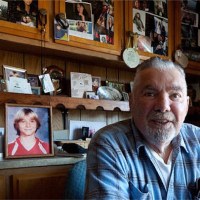 Except
for Don, Leland doesn't have much of a relationship with anyone else connected
to Kurt. He hasn't seen Frances since she was a toddler, and he and Wendy,
Kurt's mom, were never especially friendly. He's also on Courtney's shit list
for publicly raising questions about Kurt's death. He was quoted in an April
2004 issue of People saying he thought Kurt was murdered.
Except
for Don, Leland doesn't have much of a relationship with anyone else connected
to Kurt. He hasn't seen Frances since she was a toddler, and he and Wendy,
Kurt's mom, were never especially friendly. He's also on Courtney's shit list
for publicly raising questions about Kurt's death. He was quoted in an April
2004 issue of People saying he thought Kurt was murdered. 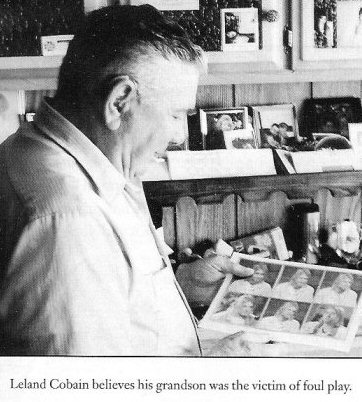 "I
have no idea who done it, but I think the cops in Seattle really goofed up," he
says. "I can't understand how he could have that much dope in him and still lift
a shotgun. And I can't understand how come his jaws weren't all broke up and
everything from the concussion when it went off and why (the gun) was still on
his chest — it should have jumped clear off his chest."
"I
have no idea who done it, but I think the cops in Seattle really goofed up," he
says. "I can't understand how he could have that much dope in him and still lift
a shotgun. And I can't understand how come his jaws weren't all broke up and
everything from the concussion when it went off and why (the gun) was still on
his chest — it should have jumped clear off his chest." 